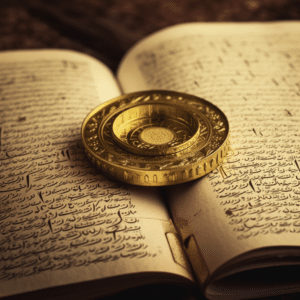Islamic fixed deposits are a testament to the UAE’s commitment to providing financial solutions that align with Shariah principles.
These deposits offer a unique blend of ethical investment and profit-sharing, distinguishing them from their conventional counterparts.
If you want to invest as an expat or high-net-worth individual, you can email me (advice@adamfayed.com) or use these contact options.
This article is here for informational purposes only, and doesn’t constitute formal legal or financial advice.
What is Islamic Fixed Deposit?
Islamic fixed deposits, deeply rooted in Islamic banking practices, operate in harmony with Shariah laws. This ensures that every transaction and investment remains untainted by Riba (interest).
Instead of traditional interest-based returns, Islamic fixed deposits adopt a profit-sharing mechanism, reflecting the essence of equitable distribution in Islamic finance.
Basic Principles of Islamic Banking
Islamic banking, often synonymous with Shariah-compliant finance, revolves around financial activities strictly adhering to Shariah (Islamic law). At its core, two pivotal principles define Islamic banking:
- Sharing of profit and loss: This ensures both the bank and the depositor share the outcomes, be it profit or loss.
- Prohibition of interest: Neither collection nor payment of interest (Riba) finds a place in Islamic banking.
These principles prioritize ethical investments and shun transactions involving prohibited elements like alcohol or gambling. Thus, Islamic fixed deposit, an offshoot of Islamic banking, champions the values of fairness, transparency, and the prevention of exploitation.

Difference between Conventional and Islamic Fixed Deposits
The primary distinction between conventional and Islamic fixed deposits lies in their operational foundation.
Conventional deposits thrive on an interest-based model, where the bank promises a fixed interest on the deposited amount. On the other hand, Islamic fixed deposits function in a profit-sharing paradigm. Here’s how it works:
- Banks pool the money from Islamic fixed deposits and invest it in Shariah-compliant ventures.
- The profits (or losses) from these ventures get distributed among the depositors.
Furthermore, the global Islamic finance industry witnessed growth in 2021 and 2022, bolstered by increased bond issuance and a rejuvenating economic recovery in financial markets.
Despite the pandemic’s challenges, Islamic assets even managed to surge over 10% in 2020. This growth underscores the robustness and resilience of Islamic financial instruments, including the Islamic fixed deposit.
While conventional and Islamic fixed deposits aim to grow the depositor’s money, their methods differ. The former relies on predetermined interest, while the latter thrives on shared profits from ethical and Sharia-compliant investments.
Benefits of Choosing Islamic Fixed Deposit in UAE
The UAE, with its robust financial infrastructure and commitment to Islamic banking, presents a compelling case for those considering an Islamic fixed deposit.
Shariah-Compliant Investment
When you opt for an Islamic fixed deposit in the UAE, you consciously choose to align your investments with Shariah principles. Islamic fixed deposits stand out for their commitment to ethical investments.
By choosing this financial instrument, you ensure your funds don’t inadvertently support industries or practices that go against Islamic teachings. This commitment not only aligns with religious beliefs but also offers peace of mind, knowing that your money promotes positive societal values.
The prohibition of Riba in Islam is a well-established principle. Islamic fixed deposits honor this principle by operating on a profit-sharing model rather than accumulating interest.
This approach ensures that both the bank and the depositor share the profits and losses, promoting fairness and mutual benefit.
Profit Sharing Mechanism
One of the standout features of Islamic fixed deposits in the UAE is their unique profit-sharing mechanism.
Unlike conventional banking systems that rely on fixed interest rates, Islamic banks determine profit rates for Islamic fixed deposits based on the actual returns from their investments.
These banks actively seek out and invest in halal ventures. Once these ventures yield profits, banks distribute them among Islamic fixed deposit holders, ensuring a transparent and equitable system. Central to the functioning of Islamic fixed deposits are the Mudarabah and Wakalah contracts.
Mudarabah is essentially a partnership agreement. In this arrangement, one party (the depositor) provides the capital, while the other party (usually the bank) offers its expertise in investing and managing the funds.

These investments’ profits (or losses) then get shared between the two parties based on a pre-agreed ratio. On the other hand, Wakalah is an agency contract. In this setup, the depositor appoints the bank as an agent to invest the funds on their behalf.
The bank then charges a fee for its services, and any profits above this fee go to the depositor.
Top 5 Islamic Fixed Deposit Options in UAE
The UAE boasts several banks offering attractive Islamic fixed deposit options.
Emirates Islamic Bank Fixed Deposit
Emirates Islamic Bank, a leading financial institution in the UAE, has carved a niche for itself with its exceptional Islamic fixed deposit schemes. Emirates Islamic Bank’s Islamic fixed deposit scheme is not just about attractive profit rates.
It’s about offering a holistic banking experience. Customers enjoy the flexibility of choosing their deposit tenure, ranging from a few months to several years.
The bank also prides itself on upholding the highest standards of transparency, ensuring that customers fully understand where their money is being invested and how profits are generated. Profit rates are a significant draw for any depositor.
Emirates Islamic Bank ensures that its Islamic fixed deposit holders are rewarded with competitive rates. These rates are derived from the bank’s investments in Shariah-compliant sectors, ensuring both ethical investments and attractive returns.
Factors to Consider Before Opting for an Islamic Fixed Deposit
Tenure of the Deposit
The tenure or duration you choose for your Islamic fixed deposit plays a pivotal role in shaping the financial benefits you’ll receive. Like any investment, the time horizon can dictate the risk and reward ratio.
Short-term vs. Long-term Deposits
When considering an Islamic fixed deposit, it’s essential to weigh the advantages and disadvantages of both short-term and long-term tenures:
- Short-term Deposits: These are typically deposits with tenures ranging from a few months to a year. The primary advantage of a short-term Islamic fixed deposit is liquidity. You can access your funds relatively quickly, making it a suitable option if you anticipate needing the money in the near future. However, the trade-off is often a lower profit rate compared to longer tenures.
- Long-term Deposits: Ranging from more than a year to several years, long-term deposits lock in your funds for extended periods. The primary benefit here is the attractive profit rates. Since you commit your money for a longer duration, banks often provide higher returns as a reward for your trust and patience. This option is ideal for individuals who view their Islamic fixed deposit as a long-term investment without the immediate need for the funds.
Impact on Profit Rates
The relationship between tenure and profit rates in Islamic fixed deposits is straightforward: the longer the commitment, the better the returns. This principle is rooted in the bank’s ability to use your funds for more extended periods, allowing them to invest in longer-term, often more profitable ventures.
As a result, they can afford to offer you a higher share of the profits. When selecting a tenure for your Islamic fixed deposit, always consider your financial goals, liquidity needs, and the prevailing profit rates for various durations.
This approach ensures you strike a balance between accessibility and maximizing returns.
Minimum Deposit Requirement
Every bank in the UAE has set standards for the least amount you should deposit in an Islamic fixed deposit. This requirement ensures that both the bank and the depositor maintain a mutually beneficial relationship.
Comparing Different Banks’ Minimums
When considering an Islamic fixed deposit, it’s essential to research and compare the minimum deposit requirements of various banks.
For instance, Sharjah Islamic Bank requires a minimum balance of AED 10,000 for its fixed deposit account. By comparing these requirements, you can ensure you choose an Islamic fixed deposit that aligns with your financial capabilities and goals.
This step helps you understand the market standards and identifies which banks are more accommodating to your financial position.
Flexibility in Deposit Amounts
Certain banks in the UAE, recognizing the diverse financial backgrounds of their customers, offer more leeway regarding the amounts you can deposit in your Islamic fixed deposit.
For instance, while some banks might have a high minimum deposit requirement, they might also offer tiered profit rates that reward higher deposits with better returns.
This flexibility can be particularly beneficial for those who might not have a large sum to deposit initially but wish to increase their investment over time. It’s always a good idea to inquire about such provisions, as they can provide a more tailored banking experience.
The Importance of Meeting Minimum Requirements
Meeting the minimum deposit requirement is crucial when opening an Islamic fixed deposit. Failing to maintain the required minimum can lead to reduced profit rates or even penalties in some cases.
Moreover, consistently maintaining or exceeding the minimum deposit can sometimes qualify you for special offers or premium services from the bank.
It’s always advisable to be aware of these nuances to make the most of your Islamic fixed deposit.
Incremental Deposits and Their Benefits
Some banks in the UAE allow depositors to make incremental deposits to their Islamic fixed deposit accounts. This feature is especially beneficial for those who receive regular income and wish to invest portions of it periodically.
By making incremental deposits, you can potentially increase your overall profit from your Islamic fixed deposit over time. Before committing to a bank, check if they offer this feature and understand its associated terms.
Early Withdrawal Penalties
Making an early withdrawal from your Islamic fixed deposit can have consequences. Banks establish these penalties to encourage depositors to keep their funds invested until the agreed-upon maturity date.
When you decide to withdraw your funds before this date, you may face financial repercussions.
Understanding the Terms
Every Islamic fixed deposit comes with a set of terms and conditions that outline the rules of engagement between the depositor and the bank.
These terms cover various aspects, including the profit-sharing mechanism, tenure, and penalties for early withdrawal. Before committing your funds, ensure you thoroughly read and understand these terms.
Knowledge of these conditions prevents unexpected surprises and empowers you to make decisions that align with your financial goals.
Remember, an informed depositor is less likely to encounter issues with their Islamic fixed deposit.
How it Affects Your Profits
The allure of an Islamic fixed deposit lies in the promise of shared profits over time. However, making an early withdrawal disrupts this profit accumulation process.
When you pull out your funds before the maturity date, you miss out on potential profit increments that longer tenures offer. Moreover, the penalties incurred for early withdrawal directly reduce your earned profits, sometimes significantly.
For instance, if you had an Islamic fixed deposit that promised a certain percentage of profit over a year, withdrawing after just six months might not only halve your expected profits but also subject you to penalties, further diminishing your returns.
It’s crucial to weigh the immediate need for funds against the long-term benefits of investing your money in the Islamic fixed deposit.

Conclusion: Making an Informed Decision
Islamic fixed deposits in the UAE have emerged as a preferred halal investment avenue for many. With its foundation in Shariah principles, it ensures that your investments remain ethical and in line with Islamic teachings.
Islamic fixed deposits in the UAE, such as those offered by Sharjah Islamic Bank, operate on two primary Islamic concepts: Mudaraba and Wakala.
Mudaraba-based Deposits
Mudaraba is a profit-sharing partnership investment contract. In this arrangement, the customer acts as the Rubul Mal (Investor) and the bank as the Mudarib.
As an Islamic institution, Sharjah Islamic Bank utilizes deposit funds in Sharia-compliant finance activities. After ascertaining the profit, they distribute it between the bank and the investors based on pre-agreed percentages.
Wakala Deposits
Wakala represents an Agency Investment Contract. Here, the customer (Principal) appoints the bank as its agent to carry out investment activities based on an agreed plan.
The bank, or ‘wakil,’ specifies expected returns from the funds and offers that to the customers.
Evaluating Fixed Deposit Products
Sharjah Islamic Bank provides a selection of deposit accounts tailored to customer needs. Their Islamic fixed deposit account allows flexible investment periods of up to 12 months, ensuring Sharia’a-compliant profit distribution.
It’s crucial to stay updated with the current profit rates when considering an Islamic fixed deposit. For instance, Sharjah Islamic Bank offers varying expected profit rates based on the deposit’s tenure, ranging from 1.125% for 1 month to 3.00% for 12 months.
The bank calculates profit based on a 360-day calendar year, accruing daily. For a deposit amount of AED 100,000 with a tenure of 12 months and an expected profit rate of 3.00% p.a., the total profit would amount to AED 3,000, bringing the total deposit value at maturity to AED 103,000.
Seeking Expert Advice
While the information provided gives a comprehensive overview of Islamic fixed deposits, it’s essential to consult with financial experts or bank representatives.
They can offer personalized advice, ensuring you select the best Islamic fixed deposit that aligns with your financial aspirations and religious beliefs.
By thoroughly understanding the intricacies of Islamic fixed deposits and comparing the options available in the UAE, you can make an informed decision that resonates with your financial goals and religious values.
Pained by financial indecision? Want to invest with Adam?

Adam is an internationally recognised author on financial matters, with over 760.2 million answer views on Quora.com, a widely sold book on Amazon, and a contributor on Forbes.



